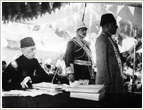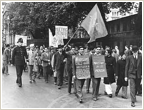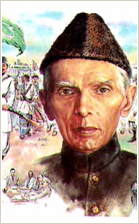
One Hundred Years of All India Muslim League


In December of 1906, a group of nationalist Muslim leaders gathered
in Dhaka, India and proposed a Muslim political association with
three aims: to protect Muslim interests, to counter Congress
influences, and to support the British administration. The first
meeting of this new entity, named the All India Muslim League [AIML], was held in Karachi on December 20th, 1907. The next hundred years of the AIML, stretching from Dhaka to Karachi, can only be described as tumultuous. While the party and its ideologies gained significance in the Indian nationalist scene, it also underwent various evolutions as it struggled to represent the often dueling agendas and hopes for the millions of Muslims in India.
The importance of the AIML to the anti-colonial movement in India is
thus readily apparent. It trained and groomed generations of Muslim
leaders on local, national and international scales as it played
pivotal roles in the two partitions of India and the creation of
Pakistan and Bangladesh. In that regard, no history of nationalism in
India can be written without due attention to the Muslim League.
However, the history of AIML is of even more relevance in today's
world. The oft-heard refrain about the lack of democracy and
democratic practices in the Muslim world fails utterly to account for
institutions like the Muslim League—an erasure which deserves a
sustained critique through renewed attention to this organization's
history of charted and documented practice of Muslim democracy in India.
The focus of the colloquium will be squarely on the League itself. We
seek an approach to topics such as Muslim nationalism in the early
20th c., the participation of landed elites in the League, Jinnah,
the League's relationship with the Empire, Congress, religious
institutions, etc., through the prism of the organizational and
ideological setup of the Muslim League itself. The colloquium will
consist of paper presentations and a keynote, as well as roundtable
discussion throughout the day. The colloquium will also be the first
step in the organization of a Digital Archive, consisting of primary
resources and analysis, on the history and legacy of the Muslim League.






The resolution which I have the honour of moving today has been so framed that the object of our League is frankly the protection and advancement of our political rights and interests, but without prejudice to the traditional loyalty of Musalmans to the Government, and goodwill to our Hindu neighbours. Whenever it is necessary to do so, we shall represent our views to the Government, and respectfully submit our claims for due consideration. But whenever the intention of any measure of Government is misunderstood by our people, it shall equally be our duty to remove that misconception
- Nawab Salimullah Bahadur, December 30 1906
We are grateful for the generous support of Committee on Southern Asian Studies, the Norman Wait Harris Fund, and The American Institute of Pakistan Studies (AIPS), for making this event possible.
Please direct all enquiries to Manan Ahmed
University of Chicago Colloquium, Nov 4, 2006

